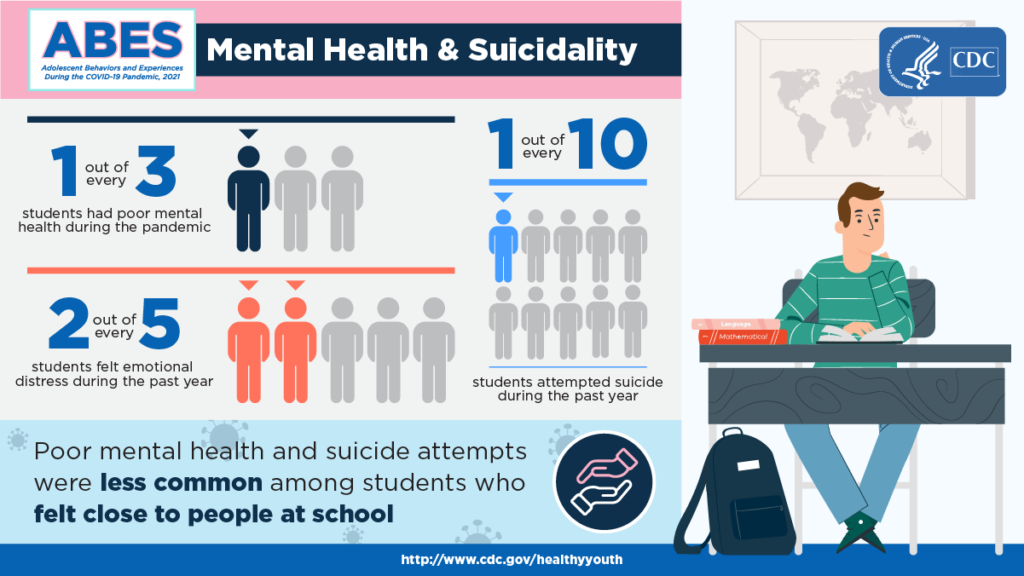What Is A Psychotic Break?
A psychotic break, also known as a psychotic episode or psychosis, refers to a severe mental disturbance during which an individual experiences a significant departure from reality. It is characterized by losing touch with external reality and an altered perception of one’s thoughts, emotions, and surroundings.
During a psychotic break, individuals may exhibit hallucinations, delusions, disorganized thinking, and disrupted behavior, which can be distressing and disruptive to their daily lives. Psychotic breaks are often associated with psychiatric conditions such as schizophrenia, bipolar disorder, or severe depression. However, they can also be triggered by drug use, extreme stress, or certain medical conditions.
Prompt diagnosis and appropriate treatment are essential to help individuals regain stability and manage their symptoms effectively.
What Causes A Psychotic Break?
The causes of a psychotic break can be multifaceted and vary from person to person. While the exact mechanisms are not fully understood, several factors are known to contribute to the onset of a psychotic break. Here are some common causes:
- Psychiatric Disorders: Psychotic breaks are often associated with underlying psychiatric conditions, such as schizophrenia, schizoaffective disorder, bipolar disorder, or severe depression. These disorders involve imbalances in brain chemicals (neurotransmitters) and abnormalities in brain structure and function.
- Substance Abuse: Certain substances, particularly hallucinogens like LSD or excessive use of stimulants like amphetamines, can induce temporary psychosis or trigger a psychotic break. Substance abuse can disrupt brain chemistry and increase the risk of developing psychosis.
- Extreme Stress or Trauma: Experiencing significant stress, trauma, or a major life event can overwhelm an individual’s coping mechanisms and contribute to developing a psychotic break. This can include events like losing a loved one, physical or emotional abuse, or a sudden and intense change in circumstances.

Skip To:
Learn More:
- Obsessive Compulsive Personality Disorder & OCD
- DBT Therapy, Conditions to Treat, The 5 Functions of DBT, Benefits & Mental Health Treatment
- What are Obsessive Thoughts? Their Connection With OCD
- CBT Therapy for Mental Health Disorders, Process, Efficacy, Techniques, Types & CBT for Co-Occurring Disorders
- Co-occurring disorders, Diagnosis, Risk Factors, Mental Health, Substance Abuse & Dual Diagnosis Rehab Washington
- We Level Up WA Mental Health Center
- How to help someone with Drug Addiction and Depression, Dual Diagnosis Rehab Washington
- 25 Signs of Narcissistic Parents
- Genetic Factors: Evidence suggests a genetic predisposition to psychotic breaks. A family history of psychotic disorders increases the likelihood of experiencing a psychotic break.
- Neurological Conditions or Medical Issues: Certain neurological conditions, such as brain tumors, epilepsy, or autoimmune disorders affecting the brain, can lead to psychosis. Additionally, some medical conditions or hormonal imbalances can contribute to the development of psychotic symptoms.
It’s important to note that while these factors can increase the risk of a psychotic break, not everyone exposed to them will necessarily experience one. The interplay of genetic, environmental, and individual factors is complex, and more research is needed to understand the causes of psychotic breaks fully.
Psychotic Breaks Facts
Psychotic Breaks Overview
A psychotic break refers to a period of severe mental disturbance where individuals experience a departure from reality. It is characterized by hallucinations, delusions, disorganized thinking, and disrupted behavior. Psychiatric disorders, substance abuse, extreme stress, or other factors can trigger psychotic breaks. Prompt diagnosis and treatment are crucial for managing symptoms and promoting recovery.
Signs Of A Psychotic Break
Symptoms of a psychotic break include hallucinations, delusions, disorganized thinking, disrupted behavior, and a loss of touch with reality.
Psychotic Breaks Treatments
- Medication: Antipsychotic medications are commonly prescribed to manage symptoms and help individuals regain stability. These medications regulate brain chemicals and reduce hallucinations, delusions, and other psychotic symptoms.
- Psychotherapy: Various forms of psychotherapy, such as cognitive-behavioral therapy (CBT) or individual therapy, can assist individuals in understanding and managing their symptoms, improving coping skills, and enhancing overall functioning.
- Hospitalization: In severe cases or when there is a risk of harm to oneself or others, hospitalization may be necessary to provide a safe and structured environment for stabilization and assessment.
End the Emotional Pain. Get Your Life Back.
Feeling Depressed, Anxious or Struggling with Mental Health Illness? Get Safe Comfortable Mental Health Dual Diagnosis High-Quality Therapy From Counselors That Care. Begin Your Recovery Now.
Hotline: (509) 348-4077

Psychotic Break Statistics
According to American statistics on psychosis, 3 out of every 100 citizens either have or will experience a psychotic episode at some point. Due to the decreased prevalence of psychotic disorders, this does not automatically imply that they will experience one. Less than 1% of Americans suffer from a psychotic condition.
1%
1% of Americans suffer from a psychotic condition.
Source: National Institute on Mental Health
0.3%
0.3% of the population is affected by Schizoaffective Disorder.
Source: National Alliance on Mental Illness
0.18%
Around 0.18% of people have a delusional disorder.
Source: National Institute of Mental Health
Get Help. Get Better. Get Your Life Back.
Searching for Accredited Dual Diagnosis Mental Health Centers Near You?
Even if therapy failed previously, or are in the middle of a difficult crisis, we stand ready to support you. Our trusted behavioral health specialists will not give up on you. When you feel ready or just want someone to speak to about counseling alternatives to change your life call us. Even if we cannot assist you, we will lead you to wherever you can get support. There is no obligation. Call our hotline today.
FREE 24/7 Dual Diagnosis Mental Health Services Hotline
Psychotic Break Symptoms
Symptoms of a psychotic break may include:
- Hallucinations: Perceiving things that are not present in reality, such as hearing voices, seeing objects or people that aren’t there, or experiencing tactile sensations without external stimuli.
- Delusions: Holding strong beliefs not based on reality or evidence, such as having paranoid thoughts or thinking that one possesses special powers or abilities.
- Disorganized Thinking: Exhibiting difficulties in organizing thoughts, speaking coherently, or maintaining logical connections in conversation.
- Disrupted Behavior: Displaying unusual or unpredictable behavior inconsistent with social norms, such as agitation, aggression, or withdrawal from social interaction.
- Altered Perception: Having a distorted sense of time, space, or self, feeling detached from reality, or experiencing a sense of unreality (derealization), or feeling disconnected from oneself (depersonalization).
- Impaired Functioning: Experiencing difficulties in daily functioning, such as neglecting personal hygiene, struggling to maintain employment or academic performance, or having trouble with relationships.
It’s important to note that these symptoms can significantly impact an individual’s well-being and ability to function in various aspects of life. It is essential to seek professional help and support for appropriate diagnosis and treatment.
Psychotic Break Vs. Nervous Breakdown
Psychotic Break:
- A psychotic break refers to a period of a severe mental disturbance where individuals experience a departure from reality.
- It is characterized by symptoms such as hallucinations, delusions, disorganized thinking, and disrupted behavior.
- Psychotic breaks are often associated with schizophrenia, schizoaffective disorder, or severe depression.
- Treatment typically involves a combination of medication, therapy, and support services to manage symptoms and promote stability.
Nervous Breakdown:
- “Nervous breakdown” is a non-medical and informal term used to describe a state of acute mental distress or emotional exhaustion.
- It is not a specific psychiatric diagnosis but a general term used to describe many symptoms and conditions.
- A nervous breakdown may be triggered by overwhelming stress, trauma, or a combination of factors.
- Symptoms can vary, including extreme fatigue, emotional instability, anxiety, depression, difficulty concentrating, and a reduced ability to cope with daily life.
- Treatment for a nervous breakdown typically involves therapy, stress management techniques, self-care, and support from mental health professionals.
While there may be some overlap in symptoms, it’s important to note that “nervous breakdown” is not a clinically defined term and lacks the specificity and diagnostic criteria associated with a psychotic break or specific psychiatric disorders. If you or someone you know is experiencing significant mental distress, seeking professional help for an accurate diagnosis and appropriate treatment is recommended.
First-class Facilities & Amenities
World-class High-Quality Mental Health Services & Behaviroal Health Substance Abuse Treatment
Rehab Centers TourRenowned Mental Health Centers. Serene Private Facilities. Inpatient Rehab Programs Vary.
Mental Health Helpline: (509) 348-4077Proven recovery success experience, backed by a Team w/ History of:
15+
Years of Unified Experience
100s
5-Star Reviews Across Our Centers
10K
Recovery Success Stories Across Our Network
- Low Patient to Therapist Ratio
- Comprehensive Dual-Diagnosis Treatment
- Complimentary Family & Alumni Programs
- Coaching, Recovery & Development Events
- Comfortable Onsite Medical Detox Center
Bipolar Psychotic Break
A bipolar psychotic break refers to a specific type of psychotic episode that occurs within the context of bipolar disorder. Bipolar disorder is a mental health condition characterized by recurrent episodes of extreme mood swings, including periods of elevated mood or mania (known as bipolar I disorder) and periods of depression (known as bipolar II disorder).
During a bipolar psychotic break, individuals with bipolar disorder may experience symptoms of psychosis alongside their manic or depressive episodes. These symptoms include hallucinations, delusions, disorganized thinking, and disrupted behavior. The psychotic break may occur during a manic episode, depressive episode, or during periods of mood instability.

Not everyone with bipolar disorder will experience a psychotic break, and the occurrence and severity of such episodes can vary among individuals. Treatment for a bipolar psychotic break typically involves a combination of medication, such as mood stabilizers or antipsychotics, and psychotherapy to manage symptoms, stabilize mood, and promote overall well-being. Close monitoring by mental health professionals is crucial to ensure appropriate management and support for individuals with bipolar disorder and psychotic features.
World-class, Accredited, 5-Star Reviewed, Effective Mental Health Dual Diagnosis Programs. Complete Integrated Inpatient Rehab with Free Post Discharge Therapy Planning.
Hotline: (509) 348-4077End the Emotional Pain Rollercoaster. Gain Stability & Happiness Through Recovery Treatment. Start Mental Health Counseling Today. Get Free No-obligation Guidance by Behaviroal Health Specialists Who Understand Mental Health Recovery.
Popular Psychotic Break-Related FAQs
-
What Does A Psychotic Break Look Like?
This condition can manifest in various ways. Some common signs include hallucinations (seeing or hearing things that aren’t there), delusions (holding fixed beliefs that are not based on reality), disorganized thinking (difficulty organizing thoughts or speaking coherently), disrupted behavior (engaging in unusual or unpredictable behaviors), and altered perception (having a distorted sense of time, space, or self, feeling detached from reality, or experiencing a sense of unreality).
-
Am I Having A Psychotic Break?
It can be challenging to self-diagnose a psychotic break. Suppose you are experiencing persistent hallucinations, hearing voices others do not hear, holding strong and irrational beliefs, or noticing significant disruptions in your thinking, behavior, or perception. In that case, it is crucial to seek professional help. A mental health professional can provide an accurate diagnosis and appropriate guidance based on your symptoms and situation.
-
What Does A Psychotic Break Feel Like?
A psychotic break can be an extremely distressing and disorienting experience. Individuals may feel disconnected from reality, overwhelmed by intense emotions, or their thoughts and perceptions become fragmented and distorted. It can be accompanied by confusion, fear, paranoia, or a sense of being trapped in an alternate reality. It’s important to remember that experiences can vary, and seeking professional help is essential for proper evaluation and support.
8 Steps & Tips for Maintaining Your Mental Wellbeing Informative Video
Video Script
We Level Up WA is an advanced and distinguished mental health center that provides specialized and innovative behavioral recovery therapy programs. Our facility boasts state-of-the-art amenities and an environment carefully designed to foster healing and transformation.
At We Level Up WA, we prioritize the individual needs of our clients, recognizing that each person’s journey toward mental well-being is unique. Our team of highly skilled professionals takes a personalized approach, tailoring science-based treatments to address each individual’s specific challenges and goals. We believe in the power of evidence-based therapies and stay at the forefront of advancements to ensure our clients receive the most effective care available.
One of the distinguishing features of our center is the inclusion of outdoor relaxation areas. These serene spaces provide a peaceful retreat where clients can reconnect with nature and find solace in the tranquility of their surroundings. We understand the importance of integrating holistic approaches into the therapeutic experience, and our outdoor areas contribute to a comprehensive and well-rounded treatment approach.
Our commitment to excellence extends beyond the physical environment. We foster a compassionate and supportive atmosphere where individuals feel heard, valued, and respected. We prioritize building strong therapeutic alliances and maintaining open lines of communication with our clients, empowering them to actively participate in their recovery journey.
We firmly believe in the potential for growth and transformation at We Level Up WA. We are dedicated to accompanying our clients every step of the way, providing them with the tools, guidance, and unwavering support they need to achieve lasting mental well-being. Our goal is not just to alleviate symptoms but to empower individuals to thrive and live their lives to the fullest.
Suppose you seek a mental health center that combines cutting-edge treatments, personalized care, and a nurturing environment. In that case, We Level Up WA is here to help you take that crucial step towards recovery and a brighter future.
Experience Transformative Recovery at the We Level Up Treatment Center.
See our authentic success stories. Get inspired.
Get the help you deserve.



Start a New Life
Begin with a free call to a behavioral health treatment advisor. Learn more about our dual-diagnosis programs. The We Level Up treatment center network delivers recovery programs that vary by each treatment facility. Call to learn more.
- Personalized Care
- Caring Accountable Staff
- World-class Amenities
- Licensed & Accredited
- Renowned w/ 5-Star Reviews
We’ll Call You
Search We Level Up WA Psychotic Break & Resources
Sources
- National Institute of Mental Health (NIMH) – Psychotic Disorders: https://www.nimh.nih.gov/health/topics/schizophrenia/raise/what-are-the-symptoms-of-psychotic-disorders.shtml
- Substance Abuse and Mental Health Services Administration (SAMHSA) – Psychosis: https://www.samhsa.gov/find-help/disorders/psychosis
- Centers for Disease Control and Prevention (CDC) – Mental Health – Schizophrenia: https://www.cdc.gov/mentalhealth/learn/schizophrenia/index.html
- National Alliance on Mental Illness (NAMI) – Understanding Psychosis and Schizophrenia: https://www.nami.org/About-Mental-Illness/Mental-Health-Conditions/Psychosis
- MedlinePlus – Psychotic Disorders: https://medlineplus.gov/psychoticdisorders.html
- National Institute on Drug Abuse (NIDA) – Drug-Induced Psychosis: https://www.drugabuse.gov/publications/research-reports/hallucinogens-dissociative-drugs/what-are-effects-hallucinogens
- U.S. Department of Health and Human Services (HHS) – MentalHealth.gov: https://www.mentalhealth.gov/
- Health Resources and Services Administration (HRSA) – Behavioral Health: https://www.hrsa.gov/behavioral-health
- National Library of Medicine – Psychotic Disorders: https://medlineplus.gov/psychoticdisorders.html
- National Institute of Mental Health (NIMH) – Bipolar Disorder: https://www.nimh.nih.gov/health/topics/bipolar-disorder/index.shtml